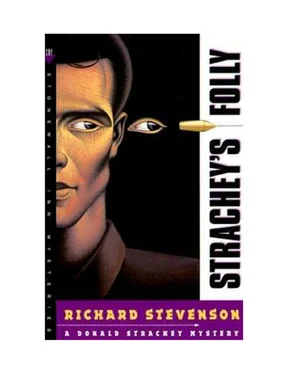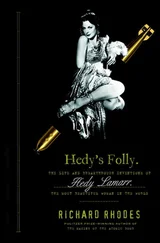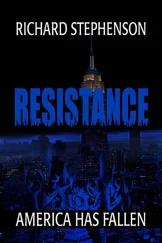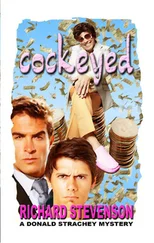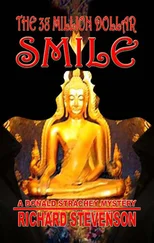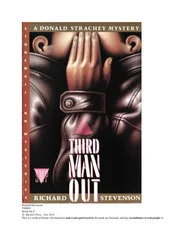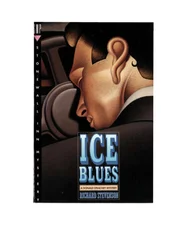Richard Stevenson - Strachey's folly
Здесь есть возможность читать онлайн «Richard Stevenson - Strachey's folly» весь текст электронной книги совершенно бесплатно (целиком полную версию без сокращений). В некоторых случаях можно слушать аудио, скачать через торрент в формате fb2 и присутствует краткое содержание. Жанр: Криминальный детектив, на английском языке. Описание произведения, (предисловие) а так же отзывы посетителей доступны на портале библиотеки ЛибКат.
- Название:Strachey's folly
- Автор:
- Жанр:
- Год:неизвестен
- ISBN:нет данных
- Рейтинг книги:3 / 5. Голосов: 1
-
Избранное:Добавить в избранное
- Отзывы:
-
Ваша оценка:
- 60
- 1
- 2
- 3
- 4
- 5
Strachey's folly: краткое содержание, описание и аннотация
Предлагаем к чтению аннотацию, описание, краткое содержание или предисловие (зависит от того, что написал сам автор книги «Strachey's folly»). Если вы не нашли необходимую информацию о книге — напишите в комментариях, мы постараемся отыскать её.
Strachey's folly — читать онлайн бесплатно полную книгу (весь текст) целиком
Ниже представлен текст книги, разбитый по страницам. Система сохранения места последней прочитанной страницы, позволяет с удобством читать онлайн бесплатно книгу «Strachey's folly», без необходимости каждый раз заново искать на чём Вы остановились. Поставьте закладку, и сможете в любой момент перейти на страницу, на которой закончили чтение.
Интервал:
Закладка:
"These assholes actually changed modern history. Jesus, Suter."
He shrugged. "There's no need to be melodramatic about it, Strachey. NAFTA might have passed anyway. It was close."
"Oh, well, when you put it that way… "
"It was a question of switching seventeen votes. Alan Mc-Chesney coordinated the campaign. I helped out, and so did a couple of other Hill people with Mexican-government business contacts and experience."
"Was the White House in on this?"
"Those clowns? Don't be silly."
"So the most historic piece of US. trade policy of the decade was made not by U.S. or Mexican elected officials, but by-who?"
Suter was staring at me now wide-eyed. "Are you really as naive as you sound?"
"No, I'm not. So who got what in return for their NAFTA votes?"
"The only outright buying of votes," Suter said conversationally, "was in the House. NAFTA pretty much sailed through the Senate. Of the seventeen House votes purchased, six were for vacation houses on the beach at Los Pajaros."
"Congressman Grandchamps, whom we saw on the beach on Wednesday, was one of those?"
"Right. Mexican law forbids outright ownership of beachfront property by foreigners, but there are easy ways around that. Banks hold the titles to property, and North Americans and other non-Mexicans buy long-term leases. So anybody planning on nailing the NAFTA vote-sellers need only follow the paper trail through the Mexican banking system."
"Okay. That's six."
"Another seven voters," Suter said, his curls fluttering in the warm breeze, "simply wanted campaign contributions that were laundered and untraceable. Vacation houses are nice, but for most House members reelection is what they anguish over night and day. They have to. It's how the system is set up. And overall, it works."
"It works for those who can afford to buy into it, yeah. So that's thirteen votes.
Four to go."
"Three congressman wanted young women, and one wanted young men.
There's nothing complicated about those motives, is there, Strachey?"
I said no.
"Strachey, you look discouraged." Suter shifted in his chaise and flopped a lithe bare leg over the side. "You needn't be. Few congressmen are out-and-out crooks like these seventeen. Most House members are-how to put it? — only as smart as they need to be. But they are, by and large, an honest lot who-even if they pocket wads of campaign cash in return for their votes- only accept cash and favors from those industry and other groups whose positions they honestly agree with. That's not corruption, that's enlightened self-interest."
"How did McChesney identify seventeen congressmen who were buyable on NAFTA? That must have been a project in itself."
Suter grinned. "You'll love this. Alan hired a psychological and public-opinion consulting service-an outfit that does focus groups and whatnot-and had these guys insinuate themselves into the summer party retreats in '93- Newt ran one for the Republicans and the Democrats had theirs-touchy-feely conferences where the participants all bare their ideological souls and plot strategy to save mankind through party-sponsored legislation. The consultants came back with a list of twenty-six names of male and female representatives of both parties who were considered buyable types. We only used seventeen names.
The other nine Alan was holding in reserve."
I swigged from my beer. "Fascinating."
"Isn't it?"
"So who shot Maynard? And why?"
Suter said nothing. His bare chest rose and fell in the moonlight. He shifted on his chaise but didn't speak.
"Maynard was your friend," I said. "Once he'd been your lover. Not that that would have singled him out in a crowd."
Suter ignored the slur. After a moment, he said, "When Maynard saw me in Merida last month, I was afraid something insane like this would happen. I'm just sick over the whole thing, honestly. I thank God Maynard survived the shooting. I just thank God for that."
"So who shot him?"
"According to Jorge, two of the Ramos drug gang in Alexandria shot and meant to kill Maynard. Alan McChesney told them to do it. Alan saw Maynard at the AIDS quilt display reading pages from the Betty Krumfutz campaign bio on the panel with my name on it, and Alan thought / had submitted the panel and was sending messages to Maynard and other people about where I was and what I knew about Alan and the Ramoses. Alan had the Ramos goons rip the papers off the panel, shoot Maynard, and search his house for connections with me as well as any incriminating information Maynard had that he might be getting ready to publish. Of course, no such information existed and Maynard had no such plans. Carmen LoBello had submitted the quilt panel to embarrass me, and the whole bloody chain of events started with nothing more than an absurd misunderstanding."
I thought again of Timmy and his feverish conspiracy theories, and I said, "In your letter from Merida to Maynard warning him away from you and all this crazy crap, you instructed him not to reveal your whereabouts under any circumstances to (a) anyone on the Hill or (b) anyone in the D.C. Police Department. Why did you tell him that?"
"On the Hill, Alan might have heard about it. Alan knew where I was, of course, but what I was really telling Maynard was 'Don't connect yourself with me. Don't even mention me if you want to be safe from Alan and the Ramoses.' And the Ramos drug-operation people have their own dirty cop high up in the D.C. department. A Captain something-or-other."
"Milton Kingsley?"
"That's it."
So I was the chump, after all: the conspiracy-theory skeptic, the literal-minded (lapsed) Presbyterian, the naive provincial- Rutgers, Southeast Asia, Albany who believed that individuals, simply being clumsy or neurotic, were behind nearly all major human folly. "My partner, Timothy Callahan-who attended parochial schools as a child-predicted some huge and melodramatic thing like what you have just described to me. I told him he was paranoid."
Suter laughed.
"I told him he'd read too much Sanders and Ambler and Ludlum. I told him the cause of almost all human misery is individual human weakness. I told him conspiracies like the one you just described to me exist only in popular entertainments and that real life is at the same time simpler and a hell of a lot more interesting than big, complicated, secret plots are."
"Sometimes real life is," Suter said, "but less and less so every day. Ludlum and Oliver Stone aren't just melodramatic entertainers. They are prophets, and they are manufacturers of self-fulfilling prophecies. Anyway, in the corporatized global economy, you don't call what happens conspiracies anymore. You call it integrated strategies."
"Someone else said nearly the same thing to me just last night. She called it synergy."
"All those guys on airplanes reading John Grisham might or might not share Grisham's moral disapproval of his worst characters' treacherous behavior. But mostly they read him because he describes the business and government world they know, or that they see coming and that they want a piece of. Human folly is still human folly, Strachey. It's just better organized and more efficient than it used to be."
"So what's the big difference between Big Brother Joe Stalin and Big Brother whatever it is you're endorsing here, Suter?"
"Much higher standard of living. Infinitely more personal freedom. Are you kidding, Strachey? There's no comparison."
"It's still Big Brother-Conglomerates and the Governments They Buy Big Brother-making people's decisions for them about the ways they'll live the only lives they'll ever have."
"Oh? So who's complaining?" Suter said dismissively, and opened another bottle of beer.
I said, "So. Did Alan McChesney have Bryant Ulmer killed?"
Suter nodded once.
Читать дальшеИнтервал:
Закладка:
Похожие книги на «Strachey's folly»
Представляем Вашему вниманию похожие книги на «Strachey's folly» списком для выбора. Мы отобрали схожую по названию и смыслу литературу в надежде предоставить читателям больше вариантов отыскать новые, интересные, ещё непрочитанные произведения.
Обсуждение, отзывы о книге «Strachey's folly» и просто собственные мнения читателей. Оставьте ваши комментарии, напишите, что Вы думаете о произведении, его смысле или главных героях. Укажите что конкретно понравилось, а что нет, и почему Вы так считаете.
